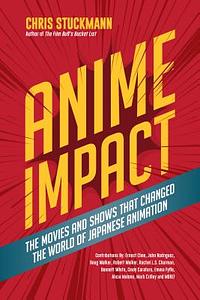Take a photo of a barcode or cover
13 reviews for:
Anime Impact: The Movies and Shows That Changed the World of Japanese Animation
Chris Stuckmann
13 reviews for:
Anime Impact: The Movies and Shows That Changed the World of Japanese Animation
Chris Stuckmann
Mainly picked this up to support Danika XIX (Comicbookgirl19), who has some entries into this book. Otherwise I probably wouldn’t have bought it. It was alright. I’m not as much into manga/anime as I used to be, but this has reminded me about some I really want to check out.
Book does what it says on the tin: shows how anime impacted the contributing authors. As a whole, it captures a point in time when anime wasn't as big stateside and serves as a nostalgia trip for anyone familiar with the times and media. It was cool to read people's discussion about shows I was familiar with and to get a more personal perspective on things I had only heard of.
One mixed blessing of this book is the multiple authors. Having chosen to read this book cover to cover, I found the differences between one author and the next to be drastic sometimes. Some were relatable while others had an almost alien perspective. Some authors brought an intense emotional insight while others gave a thorough critical analysis of a particular work. Essays on works less familiar to me coupled with a writing style that I found difficult could make reading a slog occasionally.
One thing I'd advise is to note which titles are of interest, should you choose to read it. There are definitely things that were discussed that I would like to watch. If you want to watch more anime, this book can serve as a guide in that regard.
One mixed blessing of this book is the multiple authors. Having chosen to read this book cover to cover, I found the differences between one author and the next to be drastic sometimes. Some were relatable while others had an almost alien perspective. Some authors brought an intense emotional insight while others gave a thorough critical analysis of a particular work. Essays on works less familiar to me coupled with a writing style that I found difficult could make reading a slog occasionally.
One thing I'd advise is to note which titles are of interest, should you choose to read it. There are definitely things that were discussed that I would like to watch. If you want to watch more anime, this book can serve as a guide in that regard.
Literally hundreds of interesting ideas on what to watch. Literally.
adventurous
challenging
emotional
funny
hopeful
informative
inspiring
lighthearted
reflective
slow-paced
This is getting between 3 & 4 stars! I really enjoyed parts of this book. It’s an analysis of important/ life changing anime from the perspective of consumers, critics, and filmmakers! I loved the essay style analysis of each movie and that the animes ranged from very popular to hidden gems! Something was missing from here, which is why it didn’t get a definitive 4 stars, but nonetheless I loved reading about the industry that I love from people who love it as much as I do. Also some of the writers featured in this one were incredible!! Specifically the author, Chris, was a fanatic writer!
informative
emotional
informative
inspiring
slow-paced
Not a bad little book of essays. I would encourage anyone going into this to look at this largely as a collection of personal essays from the contributors, rather than a comprehensive book of anime film history and its impact on various parts of the world, because there is very little of the latter here. The majority of the essays focus on the writers listing how certain series or films impacted their lives personally, so if that's what you're here for, this book will be a treat! If you want something that's more about the history aspect and how anime has impacted various markets, altered distribution of media, etc. then it's best to look elsewhere.
For the most part, I enjoyed this collection well enough once I realized the nature of it. I must admit to being baffled by the inclusion of some series or films and not certain others that I recall having a more widespread impact in the western sphere, but again, these essays largely seem to come from personal experience and focus on the personal experience, rather than solely concerning history on audience and market.
For the most part, I enjoyed this collection well enough once I realized the nature of it. I must admit to being baffled by the inclusion of some series or films and not certain others that I recall having a more widespread impact in the western sphere, but again, these essays largely seem to come from personal experience and focus on the personal experience, rather than solely concerning history on audience and market.
I have some major reservations about this. I started by giving it 5 stars for breadth and ambition, then knocking off 2 stars for execution, then putting one back because it's easy enough to skip what one doesn't like (unlike in a novel), then taking 1 off again for missed opportunity.
The main problem is the author has distributed his workload with uneven results. Some contributors write wonderfully evocative essays that arouse your interest without spoiling too much, convey a great sense of the tone and beauty of a show, and entice you to watch it (or lead you to realise you wouldn't like it). But other writers have crafted essays that either (a) tell you a lot about the writer and little about the show, or (b) expect you to have seen the show to be able to appreciate their article, or (c) describe the plot and events and characters with the intricacy and excitement of a perseverating tweenager, or (d) bore you to death:
"Please Teacher! and Please Twins! is a rare media-mix in which the two texts form a "worldview" that bears its own reflexivity."
Gee, I was hoping the next anime I watch would be a show which bore its own reflexivity. Thanks for the hot tip!
But as I've said, if the essay is sub-par, skip it (but either way you won't be motivated to watch the show the bad essay describes, which could be a shame. The one about Jojo's Bizarre Adventure (one of my faves!) does a terrible job of explaining what makes the show so interesting to those of us who like it. Among everything else, I think it's the gayest anime out there, like Liberace crossed with Tom of Finland crossed with Wayland Flowers and Madame level gay. Oh, and the article on Sword Art Online was given to a hater--apparently a famous hater who receives death threats via his youtube channel based on fans (crazy fans, obviously) reacting to his hatred. That's not who should be writing about the anime.
There should have been a template: what's it about? what makes it distinctive? who would like it? who wouldn't like it? what is it similar to? How is it different/better/worse than those similar shows? etc., etc. Like the OED--you don't read the definition of "asthma" and think "wow, if only the guy who wrote "slattern" had handled this word. It all matches.
Nonetheless, thanks to this book I've been exploring older anime that I never would have thought I'd be interested in. Galaxy Express has turned out to be particularly weird but haunting, and I'm glad I'm watching it.
(Note: 5 stars = amazing, wonderful, 4 = very good book, 3 = decent read, 2 = disappointing, 1 = awful, just awful. I'm fairly good at picking for myself so end up with a lot of 4s). I feel a lot of readers automatically render any book they enjoy 5, but I grade on a curve!
The main problem is the author has distributed his workload with uneven results. Some contributors write wonderfully evocative essays that arouse your interest without spoiling too much, convey a great sense of the tone and beauty of a show, and entice you to watch it (or lead you to realise you wouldn't like it). But other writers have crafted essays that either (a) tell you a lot about the writer and little about the show, or (b) expect you to have seen the show to be able to appreciate their article, or (c) describe the plot and events and characters with the intricacy and excitement of a perseverating tweenager, or (d) bore you to death:
"Please Teacher! and Please Twins! is a rare media-mix in which the two texts form a "worldview" that bears its own reflexivity."
Gee, I was hoping the next anime I watch would be a show which bore its own reflexivity. Thanks for the hot tip!
But as I've said, if the essay is sub-par, skip it (but either way you won't be motivated to watch the show the bad essay describes, which could be a shame. The one about Jojo's Bizarre Adventure (one of my faves!) does a terrible job of explaining what makes the show so interesting to those of us who like it. Among everything else, I think it's the gayest anime out there, like Liberace crossed with Tom of Finland crossed with Wayland Flowers and Madame level gay. Oh, and the article on Sword Art Online was given to a hater--apparently a famous hater who receives death threats via his youtube channel based on fans (crazy fans, obviously) reacting to his hatred. That's not who should be writing about the anime.
There should have been a template: what's it about? what makes it distinctive? who would like it? who wouldn't like it? what is it similar to? How is it different/better/worse than those similar shows? etc., etc. Like the OED--you don't read the definition of "asthma" and think "wow, if only the guy who wrote "slattern" had handled this word. It all matches.
Nonetheless, thanks to this book I've been exploring older anime that I never would have thought I'd be interested in. Galaxy Express has turned out to be particularly weird but haunting, and I'm glad I'm watching it.
(Note: 5 stars = amazing, wonderful, 4 = very good book, 3 = decent read, 2 = disappointing, 1 = awful, just awful. I'm fairly good at picking for myself so end up with a lot of 4s). I feel a lot of readers automatically render any book they enjoy 5, but I grade on a curve!
The first half of the book was great and the people talked about the shows that changed/helped shape their lives. However, in the second half the tone change and I wasn't a fan, the tone was one on what life lessons each show/movie could teach you and I found that those entries ranged from annoying to tedious.
The title requires a bit of a clarification. The authors featured in this book are focused on selling their personal stories and perspectives on the impact specific anime have had on the industry. This is basically a book of persuasive essays/anime recommendations. There are some really good authors featured here who sold me on titles I would have never otherwise checked out, but some of them are a bit dry.
Some (but not all) of the highlights of the book:
1. Chris Stuckmann (the main author)'s essay on GoShogun: The Time Etranger managed to sell me on adding a film I'd never even heard of before. (Okay, I only added it to my 'plan to watch', but that's further than a lot of anime get. I'm also not big on mecha.)
2. I'm not a Naruto fan, but Omar Rivera did a great job sharing his story and telling about how powerful Internet fandom/communities can be for introverted kids and for kids who feel embarrassed by having "nerdy" interests.
3. John Rodriguez is a great persuasive writer. I agree strongly with his thoughts on Tokyo Godfathers: "Tokyo Godfathers is often ranked as one of Mr. Kon's lesser works. Don't you buy it. It's accessible. It's uproarious. It's brave in its inclusivity."
I received a free eBook copy through a Goodreads giveaway, which had no effect on my review/rating.
Some (but not all) of the highlights of the book:
1. Chris Stuckmann (the main author)'s essay on GoShogun: The Time Etranger managed to sell me on adding a film I'd never even heard of before. (Okay, I only added it to my 'plan to watch', but that's further than a lot of anime get. I'm also not big on mecha.)
2. I'm not a Naruto fan, but Omar Rivera did a great job sharing his story and telling about how powerful Internet fandom/communities can be for introverted kids and for kids who feel embarrassed by having "nerdy" interests.
3. John Rodriguez is a great persuasive writer. I agree strongly with his thoughts on Tokyo Godfathers: "Tokyo Godfathers is often ranked as one of Mr. Kon's lesser works. Don't you buy it. It's accessible. It's uproarious. It's brave in its inclusivity."
I received a free eBook copy through a Goodreads giveaway, which had no effect on my review/rating.






